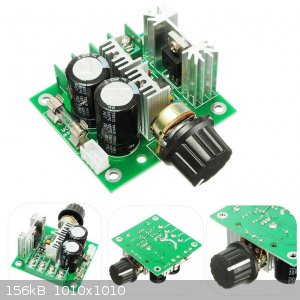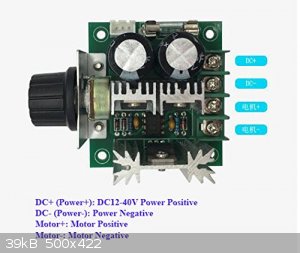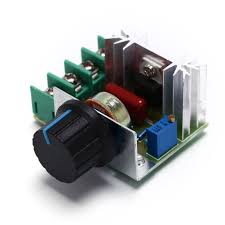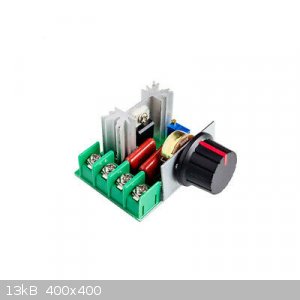JJay
International Hazard
    
Posts: 3440
Registered: 15-10-2015
Member Is Offline
|
|
Corning PC-351 Repair
I recently retrieved a Corning PC-351 hotplate/stirrer that I have not used in several years from a location where it unfortunately sat in standing
water for perhaps a year and a half. I managed to get the magnet to rotate and replaced the terminals on the heating element, but it is just not
heating... the heat indicator light comes on but is a bit patchy and the surface of the hotplate does not warm up. A voltmeter across the two hotplate
connections with the hotplate on high reads about 5.5 volts, AC when the heating element is on (at all powered-on settings) and 0 when it is off.
I would like to fix it in the easiest and cheapest way possible. It's a very popular model.... Has anyone repaired one of these before?
|
|
|
Bert
Super Administrator
        
Posts: 2821
Registered: 12-3-2004
Member Is Offline
Mood: " I think we are all going to die. I think that love is an illusion. We are flawed, my darling".
|
|
Previously:
http://www.sciencemadness.org/talk/viewthread.php?tid=15056
Is there an open circuit when you check for continuity across the heating element? (measure the resistance with heating element disconnected from rest
of apparatus, power disconnected too-)
Trouble shooting is fairly simple- Start at line in, and follow the voltage until you find the problem. If the element is good, problem will PROBABLY
be a bad switch or connection.
Rapopart’s Rules for critical commentary:
1. Attempt to re-express your target’s position so clearly, vividly and fairly that your target says: “Thanks, I wish I’d thought of putting it
that way.”
2. List any points of agreement (especially if they are not matters of general or widespread agreement).
3. Mention anything you have learned from your target.
4. Only then are you permitted to say so much as a word of rebuttal or criticism.
Anatol Rapoport was a Russian-born American mathematical psychologist (1911-2007).
|
|
|
JJay
International Hazard
    
Posts: 3440
Registered: 15-10-2015
Member Is Offline
|
|
There is a resistance of 26 ohms across the heating element. The problem is most likely in the component at the dial (which I am guessing is a triac).
It is covered with corrosion that binds it to the stirrer control circuit, so I have been reluctant to remove it (and no markings are visible). But I
may have no choice. I wonder what engineering drawings are available....
|
|
|
ParadoxChem126
Hazard to Others
  
Posts: 104
Registered: 5-4-2013
Location: USA
Member Is Offline
Mood: No Mood
|
|
I have a PC-351, and I dismantled it to take a look inside. I verify that the heater has a resistance of around 25 ohms, but 5.5 volts input to the
heating element is much too low. My heater gets close to mains voltage, around 120 volts.
Also, I doubt that component on the heating selector is a simple triac. If you listen closely while the hotplate is on, you will notice that it turns
the heater on for a few seconds, turns it off for a few seconds, and repeats this cycle. It is this variable duty cycle that adjusts the temperature
output. I was unable to locate any datasheet for this component, as it is decades old, at least in my case. The code on mine is 8424H. I assume this
has a mechanical switch/relay type component inside, because of the audible clicking. If you are able, I suggest opening up this part and
cleaning/de-rusting the switch contacts inside. This might fix the low voltage output and restore the hotplate to a fully functional condition.
|
|
|
JJay
International Hazard
    
Posts: 3440
Registered: 15-10-2015
Member Is Offline
|
|
Quote: Originally posted by ParadoxChem126  | I have a PC-351, and I dismantled it to take a look inside. I verify that the heater has a resistance of around 25 ohms, but 5.5 volts input to the
heating element is much too low. My heater gets close to mains voltage, around 120 volts.
Also, I doubt that component on the heating selector is a simple triac. If you listen closely while the hotplate is on, you will notice that it turns
the heater on for a few seconds, turns it off for a few seconds, and repeats this cycle. It is this variable duty cycle that adjusts the temperature
output. I was unable to locate any datasheet for this component, as it is decades old, at least in my case. The code on mine is 8424H. I assume this
has a mechanical switch/relay type component inside, because of the audible clicking. If you are able, I suggest opening up this part and
cleaning/de-rusting the switch contacts inside. This might fix the low voltage output and restore the hotplate to a fully functional condition.
|
8424H... there is a Fairchild MOSFET with that code... its function is very similar to that of a relay... the Fairchild one is solid state, but that
could very well be a code for a relay component.
I'll see what I can do about removing / cleaning it.
|
|
|
Orenousername
Hazard to Self
 
Posts: 79
Registered: 16-4-2016
Location: USA
Member Is Offline
Mood: Regulated
|
|
Corning PC-351 Repair
I bought a broken Corning PC-351 off ebay and received it and some parts recently, namely resistance wire. The variacs seem to be in working
condition although the heating light does not initiate when turned on; this doesn't bother me too much though and i don't wanna bother trying to fix
it. The stirrer was simply a loose connection.
I took the plate apart and the element was completely fried, burned through in multiple places. Trashed it and bought some 21 gauge FeCrAl resistance
wire. I now have to wind 25ft/9m of this 0.7mm thick wire in a flat rectangular coil 
Any tips guys? I will upload some pictures soon.
|
|
|
JJay
International Hazard
    
Posts: 3440
Registered: 15-10-2015
Member Is Offline
|
|
I have one that needs some replacement parts.... I think there is a thread on this already.
|
|
|
Texium
|
Threads Merged
19-4-2016 at 06:08 |
monolithic
Hazard to Others
  
Posts: 436
Registered: 5-3-2018
Member Is Offline
Mood: No Mood
|
|
Does someone have a diagram on how the wiring is set up on these hot plates? I'm trying to figure out how to wire up my PID controller so the magnetic
stirring is unaffected by the SSR switching on/off. The magnetic stirring knob is routed through the temperature control knob, which is then routed to
the heating element and the motor. I wonder if there's a way to break out the magnetic stirring function? Not very good at electronics, obviously.
Worst case, I guess, is I could just rip out the leads to the heating element and wire those directly to the SSR but I want to avoid that, since it
would completely bypass the temperature knob on the hotplate.
[Edited on 11-6-2018 by monolithic]
|
|
|
markx
National Hazard
   
Posts: 648
Registered: 7-8-2003
Location: Northern kingdom
Member Is Offline
Mood: Very Jolly
|
|
Quote: Originally posted by monolithic  | Does someone have a diagram on how the wiring is set up on these hot plates? I'm trying to figure out how to wire up my PID controller so the magnetic
stirring is unaffected by the SSR switching on/off. The magnetic stirring knob is routed through the temperature control knob, which is then routed to
the heating element and the motor. I wonder if there's a way to break out the magnetic stirring function? Not very good at electronics, obviously.
Worst case, I guess, is I could just rip out the leads to the heating element and wire those directly to the SSR but I want to avoid that, since it
would completely bypass the temperature knob on the hotplate.
[Edited on 11-6-2018 by monolithic] |
You very probably have to build a separate parallel circuit for the hotplate element control. Actually you do not need a PID to control the circuit,
but a simple on/off type controller will do just fine. There are such control modules available on ebay....they are cheap and compact. Perhaps you can
even manage to accomodate it in the mixer casing.
I do not know how the mixer control circuitry reacts to this, as you will have the heating element disconnected from the original control circuitry.
Most probably an error code shall be displayed and perhaps it also interferes with the mixing function, but that is individual for different mixer
models.
Exact science is a figment of imagination.......
|
|
|
G-Coupled
Hazard to Others
  
Posts: 287
Registered: 9-3-2017
Member Is Offline
Mood: Slightly triturated
|
|
Quote: Originally posted by ParadoxChem126  | | I have a PC-351, and I It is this variable duty cycle that adjusts the temperature output. I was unable to locate any datasheet for this component, as
it is decades old, at least in my case. The code on mine is 8424H. I assume this has a mechanical switch/relay type component inside, because of the
audible clicking. |
Old post I know, but I recently found that this component might be FDD8424H: Dual N & P-Channel PowerTrench® MOSFET, 40V.
If so, the datasheet for it attached below.
Attachment: FDD8424H-D.pdf (470kB)
This file has been downloaded 423 times
Attachment: FDD8424H.pdf (153kB)
This file has been downloaded 364 times
[Edited on 14-12-2019 by G-Coupled]
|
|
|
Dr.Bob
International Hazard
    
Posts: 2759
Registered: 26-1-2011
Location: USA - NC
Member Is Offline
Mood: Mildly disgruntled scientist
|
|
I still have a few old broken Corning hotplates like this if anyone wants to try to repair them or scrap them for parts. I also have a few that have
minor problems which I would love to get repaired, if anyone in the southeastern US wants to barter for stuff in return for repairing a few for me.
I did this a while back with a couple of guys.
|
|
|
draculic acid69
International Hazard
    
Posts: 1371
Registered: 2-8-2018
Member Is Offline
|
|
I don't think any circuitry will survive a year in water.try a $3 thyristor circuit.works good.type 2000w thyristor circuit motor speed controller
eBay into Google.
|
|
|
G-Coupled
Hazard to Others
  
Posts: 287
Registered: 9-3-2017
Member Is Offline
Mood: Slightly triturated
|
|
Quote: Originally posted by draculic acid69  | | I don't think any circuitry will survive a year in water.try a $3 thyristor circuit.works good.type 2000w thyristor circuit motor speed controller
eBay into Google. |
I dunno - consumer gear maybe, but most of that industrial quality lab gear is made *tough* and simple. They can survive surprising amounts of abuse
and either still function, or be easily repairable.
Those 5 buck controllers do look pretty groovy, though. 
[Edited on 14-12-2019 by G-Coupled]

[Edited on 14-12-2019 by G-Coupled]

[Edited on 14-12-2019 by G-Coupled]
|
|
|
draculic acid69
International Hazard
    
Posts: 1371
Registered: 2-8-2018
Member Is Offline
|
|
This is the one I was talking about.i don't know about the one u posted a pic of.

|
|
|
Sulaiman
International Hazard
    
Posts: 3734
Registered: 8-2-2015
Location: 3rd rock from the sun
Member Is Offline
|
|
I have both of those modules,
the photo in the post by G-Coupled is a dc in / pwm dc out module
the one in the post by draculic acid69 is the one that you want - ac input dimmer controller
CAUTION : Hobby Chemist, not Professional or even Amateur
|
|
|
G-Coupled
Hazard to Others
  
Posts: 287
Registered: 9-3-2017
Member Is Offline
Mood: Slightly triturated
|
|
Ah, I just used the term in draculic acid69's post to search with, and that was one of the very first things I found that looked the part.
Sulaiman - what did you find the part I posted useful for?
This is the right part?

[Edited on 14-12-2019 by G-Coupled]
|
|
|
draculic acid69
International Hazard
    
Posts: 1371
Registered: 2-8-2018
Member Is Offline
|
|
Quote: Originally posted by G-Coupled  | Ah, I just used the term in draculic acid69's post to search with, and that was one of the very first things I found that looked the part.
Sulaiman - what did you find the part I posted useful for?
This is the right part?
[Edited on 14-12-2019 by G-Coupled] |
Yeah right one.
Sorry bout that I should have included the AC part.
|
|
|
G-Coupled
Hazard to Others
  
Posts: 287
Registered: 9-3-2017
Member Is Offline
Mood: Slightly triturated
|
|
No worries. They're fantastic value at those prices, aren't they?
|
|
|
Sulaiman
International Hazard
    
Posts: 3734
Registered: 8-2-2015
Location: 3rd rock from the sun
Member Is Offline
|
|
To control small d.c. (permanent magnet, brushed commutator) motors such as an ex-hand-mixer motor that I use as a stirrer motor,
and 12 Vdc peristaltic pumps.
CAUTION : Hobby Chemist, not Professional or even Amateur
|
|
|
draculic acid69
International Hazard
    
Posts: 1371
Registered: 2-8-2018
Member Is Offline
|
|
Yeah they're excellent value.i use the AC ones to control my mantles temp and a small DC one for the stirrer motor.id highly recommend them as a cheap
easy way to control mantles without buying a variac or expensive brand name replacement parts.
|
|
|